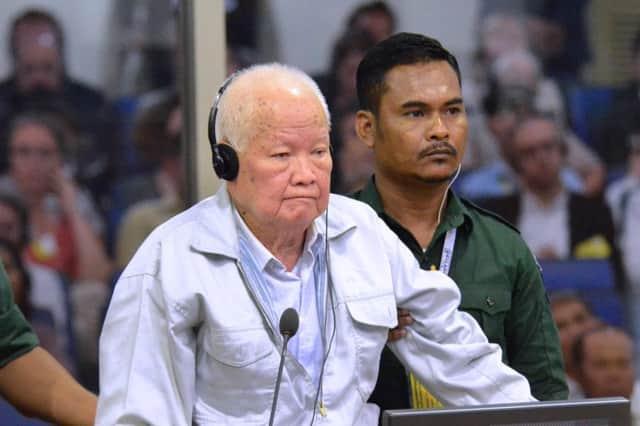Khmer Rouge leaders are found guilty of genocide in Cambodia


Nuon Chea and Khieu Samphan were top leaders in a reign of terror responsible for the deaths of an estimated 1.7 million people.
The regime forced residents out of the cities into the countryside where they laboured under brutal conditions in giant agricultural co-operatives and work projects.
Advertisement
Hide AdAdvertisement
Hide AdThe communist Khmer Rouge, under the leadership of the late Pol Pot, sought to eliminate all traces of what they saw as corrupt bourgeois life, destroying most religious, financial and social institutions.
Nuon Chea and Khieu Samphan were yesterday sentenced by the UN-assisted court to life in prison – the same punishment they were already serving after being convicted in a previous trial for crimes against humanity connected with forced transfers of people and mass disappearances. Cambodia has no death penalty.
Nuon Chea, 92, was considered the Khmer Rouge’s main ideologist and Pol Pot’s right-hand man. Khieu Samphan, 87, served as the head of state, presenting a moderate veneer as the public face for the highly secretive group.
Dissent under Khmer Rouge rule was usually met with death. Even the group’s loyalists faced torture and execution as the radical experiment at revolution failed, with blame cast about its ranks for alleged sabotage.
Executions counted for only a fraction of the death toll. Starvation, overwork and medical neglect took many more lives, amounting to as much as one quarter to one third of the entire population.
Only when an invasion by Vietnam finally drove the Khmer Rouge from power in 1979 did the magnitude of Cambodia’s holocaust become known. Yesterday’s verdict read aloud by Judge Nil Nonn established the Khmer Rouge committed genocide against the Vietnamese and Cham minorities.
Scholars had debated whether suppression of the Chams – a Muslim ethnic minority whose members had put up a small, but futile resistance against the Khmer Rouge – amounted to genocide.
The crimes against humanity convictions covered activities at work camps and co-operatives established by the Khmer Rouge. They included murder, extermination, deportation, enslavement, imprisonment, torture, persecution on political, religious and racial grounds, attacks on human dignity, enforced disappearances, forced transfers, forced marriages and rape.
Advertisement
Hide AdAdvertisement
Hide AdThe breaches of the Geneva Convention governing war crimes included wilful killing, torture or inhumane treatment. The tribunal, officially called the Extraordinary Chambers in the Courts of Cambodia (ECCC), also ordered reparations for some of those judged to be victims.
It found Khieu Samphan not guilty of genocide against the Cham for insufficient evidence, though he was convicted of genocide against the Vietnamese under the principle of joint criminal enterprise, which holds individuals responsible for actions attributed to a group to which they belong.
Among the large crowd of spectators at yesterday’s session was 65-year-old Sum Rithy. He said he had been jailed for nearly two years under the Khmer Rouge, who accused him of being a spy for the CIA. His life was spared only because he was a skilled mechanic who could maintain engines and generators for his captors.
Nuon Chea suffers heart problems and was allowed to move from the hearing room to a separate holding room. Both convicted men have suggested they were targets of political persecution.
